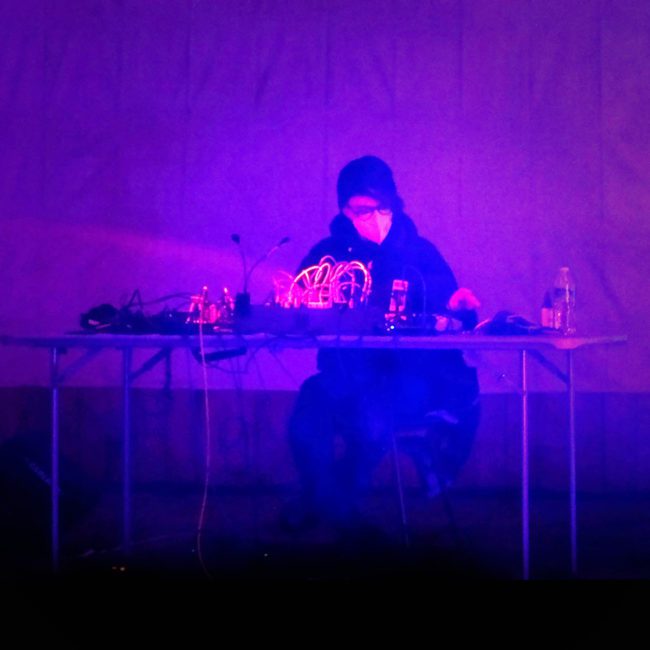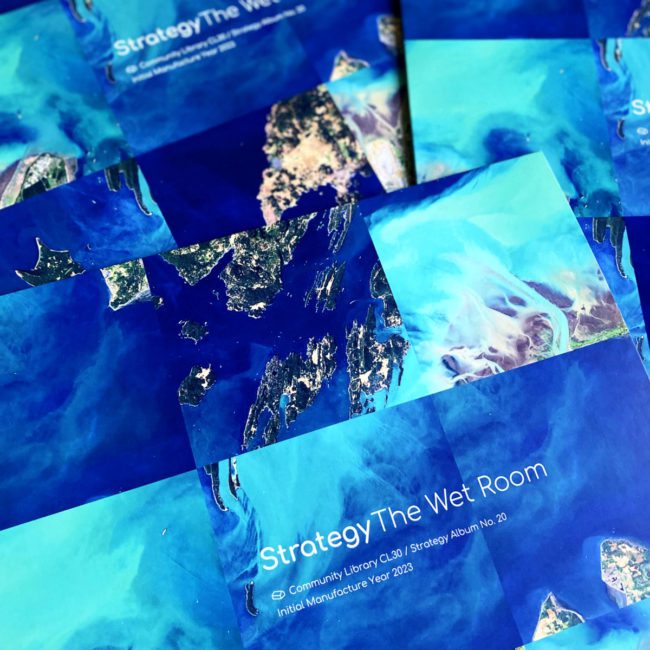American producer Strategy steps up to contribute the 382nd edition of the IA MIX Series delivering a stunning chill-out and downtempo podcast for expansive headphone listening.
Across a 20-plus year career, and as many releases, Paul Dickow operates at the crossroads of ambient, dub, and electronica. His most recent Strategy album, ‘The Wet Room‘, his 20th album to date, was released in November 2023 via Community Library, the label Paul co-runs with David Chandler. It feels both timeless and of its time, fusing elements of climate anxiety with a heady aura of leftfield sonics.
Throughout his discography, Strategy has collaborated with esteemed labels including Kranky, 100% Silk, and Peak Oil, among others, as well as operating his own Community Library imprint, for an output as vast and varied as it is consistently stellar. He’s as comfortable crafting hardware-focused, DIY techno as he is spinning long form experimental suites.
Strategy’s mix is as wide-ranging, unpredictable, and eclectic as his music, spanning Humpbacks, Seefeel, Laurie Spiegel, and Strategy himself. It’s an ideal soundtrack for expansive headphone listening or the strangest, grooviest pool party in the neighbourhood. In addition to the mix, we asked Paul all about his history, the Portland music scene, and tour memories.
Interview by Jason Cabaniss
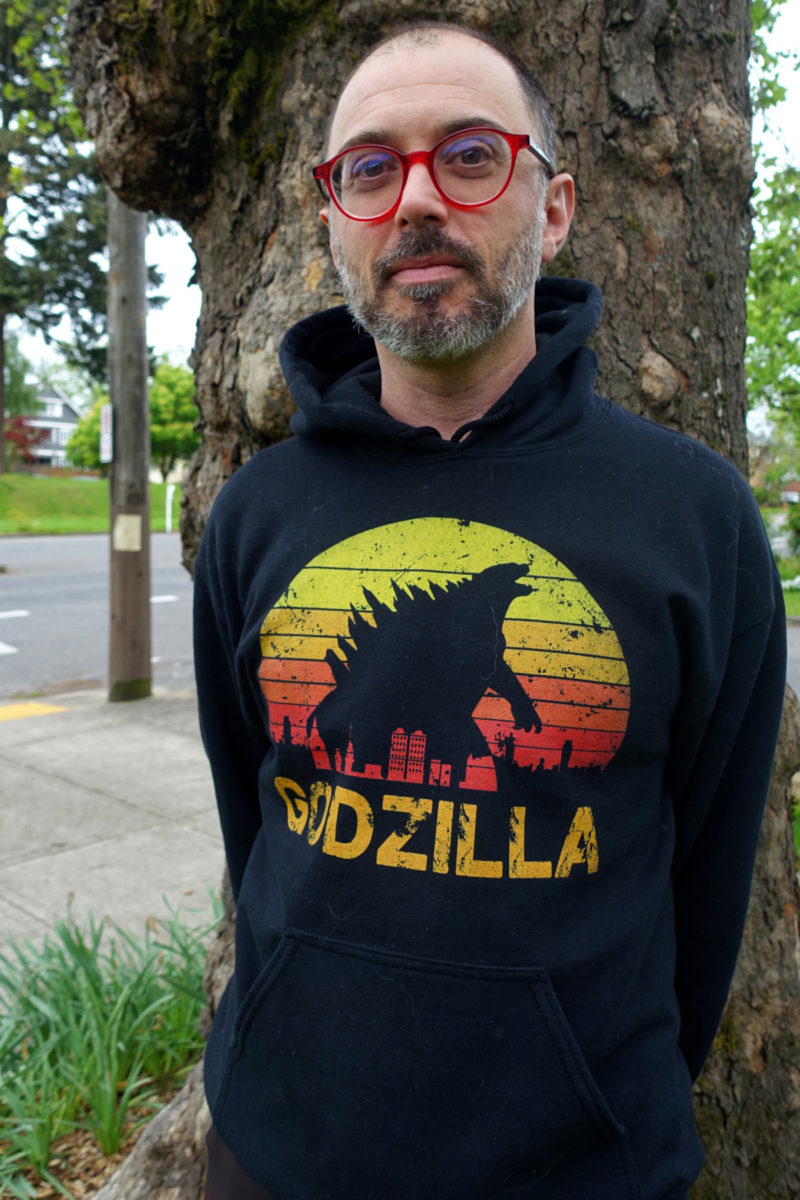
"I created a mix that reflects what I would love to hear more often: "ambient" mixes that go beyond washes of tonality in an extended format that can include forgotten oddities, perplexing juxtapositions, music with rhythms and basslines, found sounds and non-music"
Hello Paul, thanks for taking the time to make this mix for us and answer some questions. Can you tell us about the atmosphere and track selection you were aiming to conjure with this mix?
I created a mix that reflects what I would love to hear more often: “ambient” mixes that go beyond washes of tonality in an extended format that can include forgotten oddities, perplexing juxtapositions, music with rhythms and basslines, found sounds, and non-music.
Maybe this is some difference between ‘ambient’ as we encounter it today vs a ‘chill out’ sensibility- unexpected, unexplained sonic events and an uncanny, mysterious ‘dream logic’ manner that the selection and sequencing unfolds. I wanted to create a mix that has a similar approach to how I assembled the sounds, songs, and ideas on ‘The Wet Room’ LP – the type of mix I’d imagined someone putting the tunes in.
In 2023 you released your 20th album as Strategy, ‘The Wet Room‘ – a monumental achievement! The liner notes indicate you worked on the tracks over 8 years. Tell us about the process of putting it together.
Release/project/album concepts can have their own lives in my head – often for many years – as a highly detailed idea, maybe with expressions as sketches but not necessarily. In this case I would prod at the notion of the album once or twice a year and slowly write music for it, but as the overall flow and breadth of it developed in my thought space.
I was able to compose tracks specifically to flesh out the ideas I heard there, and so about half the record took 7 years to develop which consisted of 90% thinking and 10% music making, and the second half only took 1 year to accomplish and was just executing in reality all the music that had been thought and remembered.
During the process I tried to challenge my assumptions about what a ‘chill out’ record should be in an extremely un-chill age. I wanted to introduce jarring elements to trip myself up and create unexpected interjections where they traditionally shouldn’t belong. It was only through this I was able to entertain myself enough to complete the work and create the sort of puzzle that I wanted listeners to encounter and unpack.
‘The Wet Room’ has a particular dystopian downtempo vibe to it, perhaps a reflection of the impending climate change crisis? At points it sounds like a melange of Leftfield – Snake Blood as featured on Alex Garland’s iconic film The Beach and the apocalyptic vibe of Boards Of Canada’s album ‘Tomorrow’s Harvest‘. Is this a fair interpretation?
Climate change is one of several central themes that coexist on the record but there’s more to it. The concept for the album is loose and all encompassing, it is about our planet and its multifacetedness – gigantic, minuscule, doomed, paradise, home or not home.
I won’t say more than that and listeners are invited to make their own meaning of it. With respect to its dystopian qualities: it has utopian ones too though all of it overlaps in a dreamy, ambivalent in-between zone. I am most interested in the ways that utopian and dystopian themes create friction and emit weird byproducts when rubbed together.
I haven’t seen The Beach or heard Leftfield’s soundtrack, although I like Leftfield very much and am now interested to see the film (thanks for the tip!) “Tomorrow’s Harvest” was not a specific touchstone but if anyone thinks that I’ve traveled to the dreamlike terrain that BOC inhabits I’m humbled at the suggestion. They are obviously giants in the field.
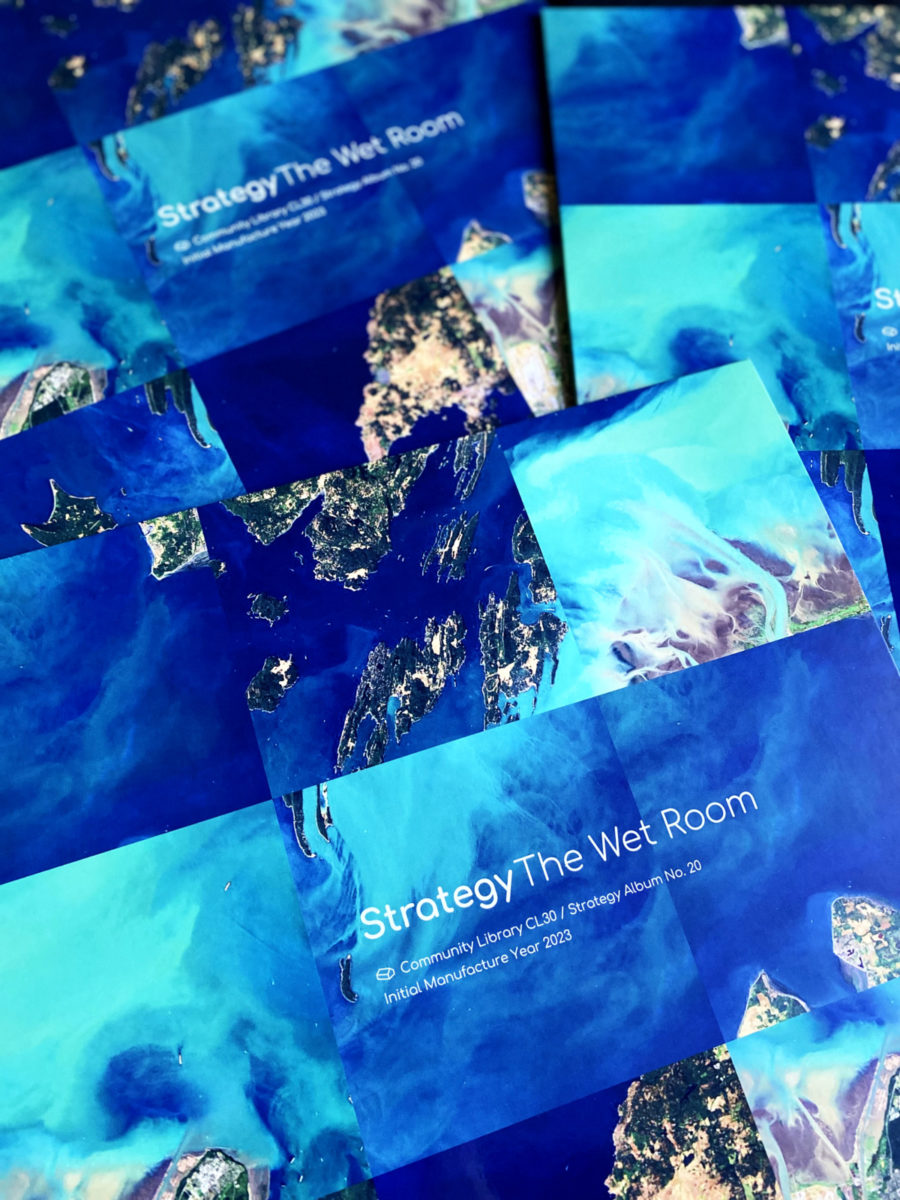
"I tried to challenge my assumptions about what a 'chill out' record should be in an extremely un-chill age. I wanted to introduce jarring elements to trip myself up and create unexpected interjections where they traditionally shouldn't belong"
The album artwork features aerial photographs of coastal / urban regions in grid formation – what area of the world is this and what significance do these photos portray?
The images are from the region where I live, the Pacific Northwest, better known as Cascadia, but they are not my immediate vicinity. This was really incidental — we had limited public domain images of appropriately high resolution to work with and I think the shots we picked for quality and character are satellite photos of areas near Vancouver, BC on the Salish Sea.
Your musical output encompasses elements of dub, ambient, and dance-adjacent techno. What are the keystone albums you heard along the way that become milestones to the development of your sound?
It’s pretty hard to narrow it down – Strategy’s output has also included stuff like house, breaks, outsider rock/pop, and noise, among other things. If I had to pick some central reference points for the Wet Room which have also influenced most of my other work… (in no particular order):
Meat Beat Manifesto – Satyricon
Labradford – Labradford
Skylab – #1
.O.rang – Herd of Instinct
Severed Heads – Since the Accident
Laika – Silver Apples of the Moon
African Head Charge – Off The Beaten Track
Vladislav Delay – Huone
Laurie Anderson – Mister Heartbreak
Ultramarine – Every Man and Woman is a Star
Kit Clayton – Nek Sanalet
Mouse on Mars – Iaora Tahiti
Miles Davis – In A Silent Way
KLF – Chill Out and The White Room
King Tubby – Presents The Roots of Dub
Seefeel – Polyfusia (a singles collection that was on CD ages ago)
There’s a lot of stuff not mentioned here that maybe shows up in less obvious ways but is distant enough from Strategy stylistically that I won’t mention it here, but it ranges from The Slits to Aube to The Ex to Skinny Puppy to JJ Cale to give you an idea of how endless it would be to try and describe.
Tell us about your own label Community Library. Established in 2005 together with Solenoid, the label seemed to halt in 2016, only to be started up again with the release of ‘The Wet Room’ in 2023 – what does the future hold for the label?
We weren’t really on pause during that period, but managing back catalog titles and preparing the 2022 release of an anthology of rare, unreleased and private press works by the UK duo Jan Steele and Janet Sherbourne. It’s more of a jazz and modern composition record and probably not relevant to some Strategy or electronic music fans, but it really set the bar for how we want to work going forward for quality and cohesion.
Releasing ‘The Wet Room‘ represents a specific emphasis on me and my label partner David Chandler (aka Solenoid, DJ Brokenwindow, Mr. Pharmacist) releasing our own music projects for the next while, something we’ve done only occasionally. Next up we will be releasing Solenoid’s music – some of his daring, unheard, braindance-adjacent recordings from the early 90s.
I first encountered you as Strategy when I saw you perform at Cairo in Seattle with Polonaise, as part of a tour promoting your respective 100% Silk releases, back in 2012. Do you have any memories of those shows? What’s changed in your live set up over the years?
I have fond memories of those shows. Cairo was a very good show, very DIY and a great crowd, I love playing in Seattle. But the best show of the trip was probably the kickoff party in David Chandler’s basement.
My live setup is constantly changing, I alter the selection of instruments based on specific musical ideas I want to try. But generally speaking it’s the same idea as what I was doing then, a lot of tabletop samplers, synths, and drum machines that take me for a ride somewhere unexpected, the basis of the patterns is loosely set and then I’ll mutate them live. Samplers are the common denominator to all my music, they’re much more important to me than synths
You’ve released albums on stellar labels such as Constellation Tatsu, Peak, Oil, Audio Dregs, and 100% Silk, among others. What do you look for in a label before you decide to work together?
I look for a curatorial approach where there’s some eclecticism stylistically across the catalog, but a ‘sense of completeness’ within each release as presented individually. I like label rosters where artists are united by an approach rather than a sound. I also look for trustworthiness, transparency, and near-total creative freedom.
We’d love to learn about your studio set up? What are your favourite pieces of gear? How has the studio evolved since you started producing music?
When I first started I knew quite a bit about electronic music as I’d grown up around it in the 80s (my dad was a music professor, we had synths at home, something readers can find in depth in other recent interviews). But I knew extremely little about recording.
In the 90s I’d been in live bands and we never had robust DIY recording setups, we went to studios when finances could be scraped together, and it was a mysterious process. I knew how to operate a four-track cassette deck though not particularly well. I’ve grown into some confidence tracking and mixing on my own, but still go to studios for some mix-downs, depending on the project.
My favourite pieces of gear, which have had significant staying power across decades of doing music: my Seck 12-channel mixing board, my Electro-Harmonix Deluxe Memory Man delay unit (formerly belonged to my bandmate in Nudge, Honey Owens), and my Roland TR-606 drum machine (currently stranded with one of my repair technicians).
The Elektron Analog Rytm Mk1 was my main ride from about 2014 to 2020, though I’ve taken a bit of a break from it. I can’t pick a favorite sampler, they all have their place — but I favor E-mu samplers of which I have many.
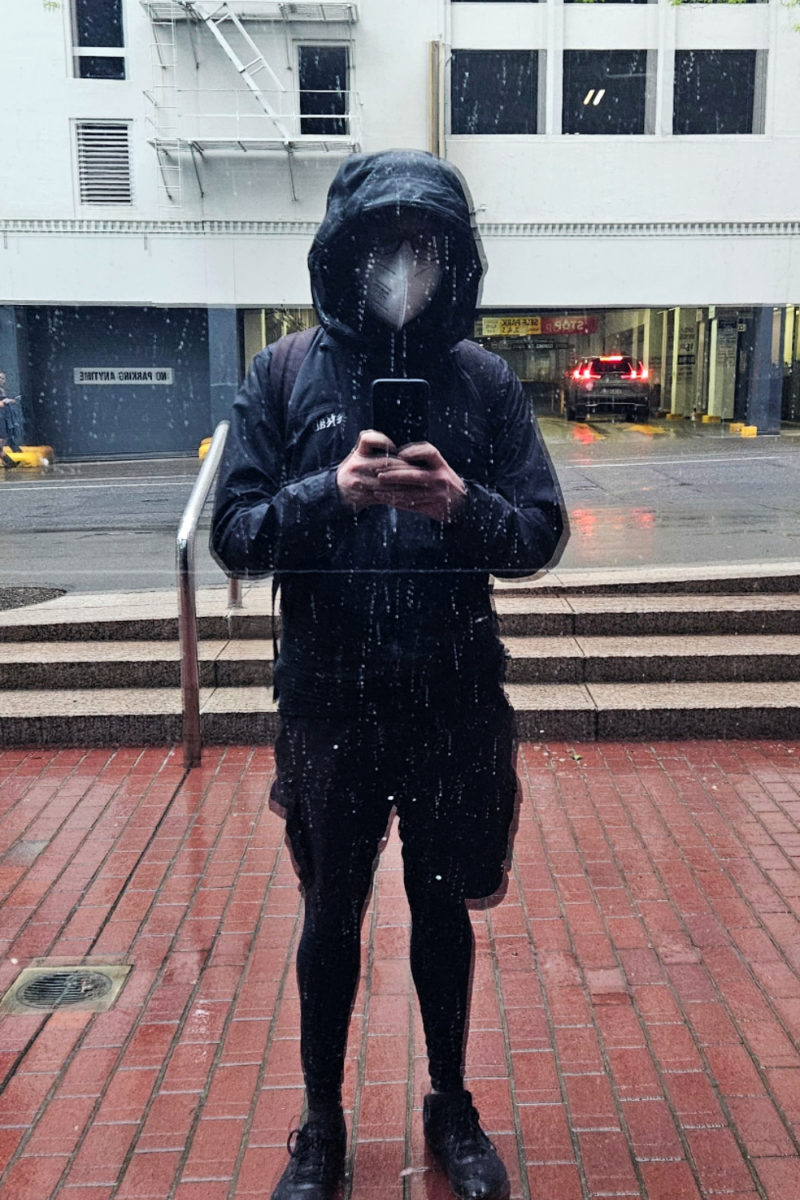
"I look for a curatorial approach where there's some eclecticism stylistically across the catalog, but a 'sense of completeness' within each release as presented individually"
As a long time resident of Portland, Oregon, can you give our readers insight into the local music scene.
When I first came here nearly 30 years ago, electronic and experimental music were ridiculed and artists and promoters were frequently denied access to the limited number of taste-making venues that existed at the time. Concerts other than vanilla indie or grunge and/or things for people under age 21 were few and far between. You had to be “in the know” to find underground punk venues or raves. As the city has grown and matured it has become more gentrified in places but there remains a strong culture of artistic daring, DIY ingenuity, and originality while not perfect, better and broader access for people than 30 years ago.
I’m humbled to share creative spaces and experiences with the people here and I like going out and seeing other “lifers” alongside people who are totally new to me, and at the times I also feel seen for all the years contributing – it makes me feel humbled and lucky to be in the midst of anything this good.
I developed a disability from Long Covid in March 2020 and now that I’m unable to go out or perform very often, I have gained a much better perspective on how good we have it here- because I’m acutely aware of how much amazing stuff I miss. I don’t think I could tell you how Portland music hangs together stylistically though, it’s a weird soup of ideas and subcultures.
Social media has become a necessary component of the music world. What’s your relationship with it and how do you navigate the pros and cons of various platforms as it relates to your music?
I do the bare minimum of social media required – promoting my musical activities is no worry, I could probably ‘do better at it,’ but at what cost/benefit? I try to avoid hot button discourse and use it instead to see how distant family/friends/associates are surviving wherever they are (usually extremely far away from me since I’m relatively homebound and travel infrequently).
I enjoy keeping a chronicle of some of my music progress in the public forum of social media, and then I go out of my way to make keep various details private altogether, or make them discoverable only by other means.
I honestly lack the attention span to burrow myself into the minutia of social media self promotion ‘best practices’ etc. I try to be my authentic self, with all the realtime stuff still on there like my mom leaving encouraging comments, leaving up a video even if it has imperfect sound or unsteady hand – whatever, you want a window into my process/musical life? Sure. I’ll let you see…some of it but not all and it may be intentionally unvarnished.
If you broke down my social media use however, it is 10% self promotion and 90% following others, because of my obsession with records and music. I use social media to (try to) keep track of all the record shops, artists, DJs, and labels whose music I crave so that I don’t miss out on their new releases, mixes, or shows (in the off-chance I’m well enough to attend).
I curate my feed around my intense need to buy loads of new records. With current underground artists all the limited stuff is ‘blink and you’ll miss it’ stuff. As you could expect I am a huge Bandcamp user for the constant barrage of dopamine-hit-inducing new release announcements. This is not hyperbole, I basically live for buying records and the interaction I have with listening to music as a fan/student/critic is really at the root of how Strategy music takes shape.
What do you have lined up for 2024?
Unknown. I’m taking the approach of ‘happening’ my way into things. I have four or so unfinished Strategy albums I should give some focus to. I’d also like to turn my focus to numerous collaborative projects and my band Wild Card but can never be sure what projects will call to me the loudest at any given time, or which opportunities might land in my lap. I love to feel surprised by things.
TRACKLIST
1. Dr. Michael Dean – Self Hypnosis (excerpt)
2. Ulf Lohman – Untitled
3. Laurie Spiegel – The Hollows
4. Excerpt from “9:34 a.m. May 5, 1961 – A Recording of the Historic Space Voyage of America’s First Astronaut LP
5. *polar – Bonus Beatless
6. Seefeel – Blue Easy Sleep
7. Nudge – Div
8. David Toop – Sunless
9. Humpbacks – Left Over Sea Running
10. .O.rang – .A.on the Samadi Trail
11. William Selman – Frigidaire Idylls
[commercial break] = Auto-Lite Spark Plugs (Raymond Scott)
12. Meat Beat Manifesto – Brainwashed This Way
13. Ultramarine – Badger
14. Dodo – Android’s Dream
15. Future 3 – Do You Dub
16. Bishop – I See You
17. Pub – Fragile Root
18. Strategy – Numeros
